Civil Liberties, Gaza, Habeas Corpus, Human Rights, Targeting Muslims, Truth to Power
Podcast: Play in new window | Download
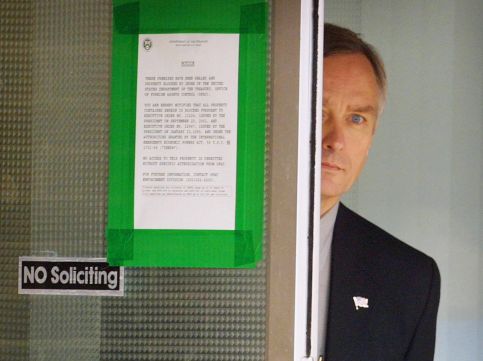
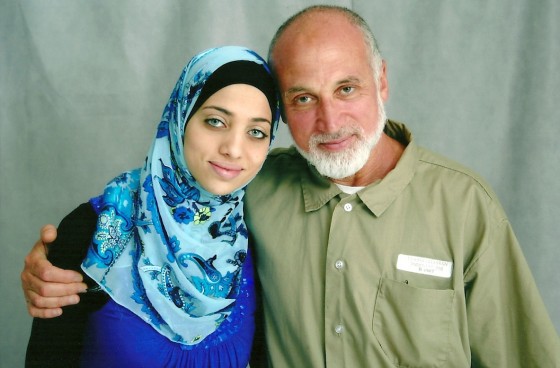
Holy Land Foundation Case Update
Hosts talk with Noor Elashi, Noor is the daughter of Holy Land Foundation prisoner Ghassan Elashi. Ghassan is currently being held in the Communications Management Unit in Marion, Illinois and has now had his visitations canceled. Noor says visitations have been cruelly obstructed by a Texas prison guard while at the prison in Seagoville Texas in October 2009. Noor’s brother Omar is 9 and has Down’s syndrome, during a visitation, Omar ran up to his father to give him a hug and the guard says “What Mr. Elashi, you think you’re an exception?” After the visit, the guard filed a complaint against Ghassan for not following instructions. The same prison guard during Thanksgiving that year, prevented his sons from entering the room during a visit. Ghassan called the guard evil and compared him to a guard at Abu Ghraib. The guard filed another complaint. After an internal investigation, Ghassan’s visitations were banned for 6 months. The visitation doesn’t usually apply when an inmate transfers to another prison, but when Ghassan was transferred to the CMU in Marion, the visitation ban was upheld. www.Freedomtogive.com
As many listeners may know, Holy Land Foundation was the largest Muslim charity in the United States, the Bush administration shut it down after the September 11th attacks, and arrested five people from the charity. During the trial, the prosecution used unrelated video of suicide bombers to emotionally sway the jury.
Noor Elashi:
- Book in progress: Eyes Like My Father, A Daughters Narrative of Displacement
- Father was sentenced to 65 years in prison for giving material support in the form of humanitarian aid to Zakat committees – Palestinian charities in the West Bank and Gaza, that prosecutors were alleging were fronts for Hamas.
- These are the very same Zakat committees that USAID, the Red Cross and UN NGOs were giving money to.
- The Holy Land Foundation, co-founded by Ghassan Elashi, was the largest charity in the US until the Bush Administration with an executive order shut it down 3 months after 9/11.
- The material support law is a very flawed law and singles out Muslim charities and with the recent upholding of the material support law by the Supreme Court, I feel that Americans are at risk.
- There were 2 trials (for Ghassan Elashi) the first in 2007 which looked at the Zakat committees. Jury deadlocked on most counts against the HLF. The prosecution showed the jury scenes of terrorism, buses being blown up expecting the jury to be prejudiced by seeing this and convict Ghassan Elashi, and they didn’t.
- In the second trial, the prosecutors were more aggressive, the defense attorneys, families and civil libertarians around the world were flabbergasted, when the jury delivered all guilty verdicts after 9 days of deliberation.
- Trials took place in Dallas, Texas. Ghassan Elashi, Noor’s father and the CEO of the Holy Land Foundation recieved a 65 year sentence. Other fund raiser reps were sentenced between 15 and 20 years.
- Ghassan Elashi currently in a CMU – Communications Management Unit in Marion, Ilinois – termed “little Guantanamos.”
- As far as visitations go, those in and of themselves are cruel and unusual punishment because you travel all that way and you can’t touch, there is a plexi-glass between you and its monitored live in Washington DC.
- Four of the defendants are being held in CMUs, 2 in Marion, Illinois and 2 in Terra Haute, Indiana.
- My father is hopeful and optimistic, he does yoga and pilates, reads the Quran.
- It was New York Senator Chuck Schumer who co-authored the anti-terrorism law in 1996 that strengthened the material support provision.
- I’m the eldest of 3 boys and 3 girls. It’s a double tragedy, these convictions that were made possible by “fear” in the courtroom and the 65 year sentence. Appeal: they have until August 3 to file briefs.
- Humanitarian Law Project Supreme Court Case upheld the material support provision.
- During both trials, the prosecutors brought in an anonymous Israeli intelligence officer who testified under a fake name. He said could smell Hamas.
- During the testimony, the court benches were cleared except for the family.
- Michael Ratner: After 9/11 they made it extremely dangerous to give money to Muslims anywhere in the world.
- Everybody is at risk at this point, even Jimmy Carter
Guest – Noor Elashi, the daughter of Holy Land Foundation prisoner Ghassan Elashi. She is a writer based in Dallas, Texas. After receiving a Bachelor’s degree in journalism from the University of North Texas, she worked for the Fort Worth Star-Telegram. In July 2008, she won the 3rd place Mayborn Literary Nonfiction Award for her manuscript titled “Displaced,” which she plans to expand into a memoir about the displacement of three generations of Palestinians: her grandmother, father, and herself. She can be reached at noorelashi@gmail.com.
——
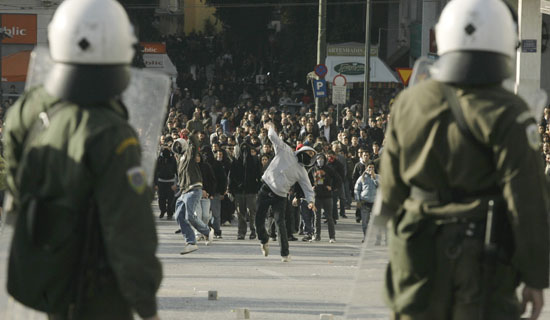

Austerity: Why and for Whom? – Rick Wolff
We are very pleased to have with us Professor Rick Wolff to update us on where we’re in this ongoing global capitalist crisis. Austerity has appeared in the titles of many recent articles on the global capitalist crisis. What is it? Rick Wolff writes in his article titled Austerity: Why and for Whom? the efforts to broaden the recovery beyond one year have failed and that failure has cost Washington trillions in borrowed funds from lenders. Those lenders now demand guarantees that those loans will be repaid to them with interest. The guaranteed demanded by lenders is “austerity.” To collect this austerity, the banks (lenders) want governments to raise taxes or cut government spending or both. Economic Recovery for the Very Few by Rick Wolff. An extreme burden imposed on the global economy. Rick asks, Why not collect austerity from tax exempt multinational corporations, churches and private institutions?
Professor Rick Wolff:
- Governments around the world borrowed enormous amounts of money, never seen before surge of borrowing. The urgency of the second impending crisis of capitalism, the second major collapse of capitalism in 75 years was so intense, the terror in the ranks of business was so complete, that nobody stopped to worry, just lend us lots of money, take toxic assets off our books and so on.
- Suddenly, the creditors who are lending to the governments are beginning to get nervous. They’ve been going to the governments and saying we don’t want to be stuck with a debt that your people might not pay back.
- Lenders: You either have to raise taxes on your people, save it and put it into a special account which will only be used to pay us interest on the principle or you cut your programs, your public services and put that into the same account.
- The name of the government’s response to the demand of its creditors is “austerity.” Imposing on society a severe regimen of rising taxes, or cut government spending to please and satisfy creditors.
- Yale, a multi-billion dollar corporation with billions of annual income, pays no taxes. Rather than increase the taxes of individual persons, why don’t we do what should have done long ago.
- Take a look at California, they’re laying thousands and thousands of state employees.
- No Economic Crisis: Annual world wealth report, the income of the top wealthiest people 2009 rose 17 percent.
- Banks are the buyers of government debt. The bankers produce a crisis, the government bails them out. The government borrows from the banks to bail them out. The bankers know there is popular opposition.
- French action against austerity: trade unions organizing general strike which will close everything in September in France. Will the pressure rise within US politicians to re-negotiate this debt?
- The state of Oregon, the democratic party controls both houses of legislature. To pay for the 700 million dollar gap over a 2 year period they raised taxes on business and wealthy people.
Guest – Richard D. Wolff is Professor of Economics Emeritus, University of Massachusetts, Amherst where he taught economics from 1973 to 2008. He is currently a Visiting Professor in the Graduate Program in International Affairs of the New School University, New York City. He also teaches classes regularly at the Brecht Forum in Manhattan.
CIA Sponsored Terror, Civil Liberties, Criminalizing Dissent, Guantanamo, Habeas Corpus, Human Rights, Targeting Muslims, Torture, Truth to Power
Podcast: Play in new window | Download
Updates:
———-
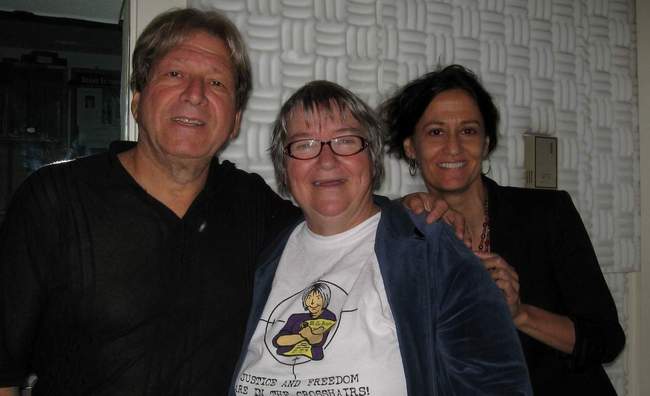
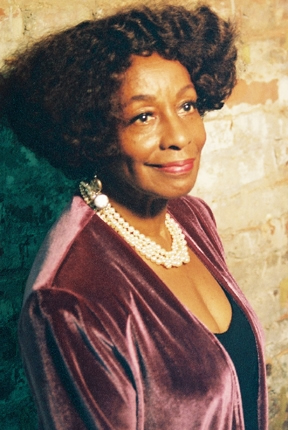
Lynne Stewart Heard A Death Sentence Today
As many listeners know Judge John G Koeltl sentenced defendant, Lynne Stewart: 120 months incarceration in the Danbury Federal Correctional Institution Connecticut on five counts to be served concurrently. Lynne Stewart is 70 years old, she’s a breast cancer survivor with other pending health issues. We’re joined by Vinie Burrows today, she is the UN representative for the Women’s International Democratic Federation and the founding member of the Granny Peace Bridgade. Vinie Burrows made powerful statements in her article titled Lynne Stewart Heard A Death Sentence Today that calls terrorism by its real name under the draconian Patriot Act.
Vinie writes, “over and over again in his remarks leading up to the sentencing, Judge Koeltl used the term “terrorist enhancement.” Those warning words bring up the specter of some of the nastiest aspects of the Cold War and its present re-incarnation in the Patriot Act which by expanding law enforcement’s surveillance and investigative powers represents a significant threat to civil liberties. Read the official text… “Uniting and Strengthening America by providing Appropriate Tools Required to Intercept and Obstruct Terrorism. The Sentencing of Lynne Stewart by Michael Steven Smith.
Vinie Burrows:
- Being at Lynne Stewart’s court hearing was useful to see the judge, to see the players, the 2 prosecuting lawyers and to see Lynne Stewart who made a marvelous opening statement. It was one of the great speeches before the bar
- I felt as he was reading, Judge Koeltl was responding to each dictate of the appellate court.
- We have to define terror. We can’t go by what the legislative, judicial and now executive define as terror. We’re looking in the wrong places for terror. A single mother with 3 children living in a shelter, she knows terror. When she doesn’t know where her next meal is coming from, that’s terror.
- When her home is foreclosed on, that’s terror, and of course our banks are the biggest terror of all.
- We can’t even think of Lynne Stewart when we talk of terror, she is a human rights defender. She’s been deprived of the ability to defend human rights.
- I think we have to go to “who are the terrorists?” who are the victims of terror?
- We have to talk about the state, the state usually the perpetrator of human rights violations.
- The state must recognize that poverty is a weapon of mass destruction.
- I think we need to talk about the Universal Declaration of Human Rights as a legal basis to mount some sort of appeal.
- Michael Ratner: This is the Time of the Toad (A Study of Inquisition In America)
- Lynne Stewart has another appeal against this severe sentence.
Guest – Vinie Burrows is an award-winning Broadway actress. She has been active at the United Nations Economic and Social Council on the issues of the status of women and Southern Africa. Burrows won the Paul Robeson Award in 1986. She was to appear in a show titled Sister! Sister! at the University of Delaware in Newark in November 1991. She was to be a panelist in the 2000-2001 African Diaspora lecture series at the Center for Ideas and Society in Riverside, California.
——–


Mountain Top Removal Activists Arrested For Direct Action In Virginia (Updated)
Last week 4 activists with Climate Ground Zero and Mountain Justice were arrested for using direct action to shut down a coal mining mountaintop removal effort in Virginia. Two of the 4 activists locked themselves to heavy machinery in the coal mining pit and were later arrested. The activists say they are drawing public attention to the dangers associated with the Brushy Fork Sludge Impoundment, which contain up to 8 billion gallons of toxic coal waste. The area is unstable, Brushy Fork’s foundation is built on a honeycomb of abandoned underground mines. If the foundation were to collapse, as others have, the toxic slurry could engulf communities nearly 14 miles away, according to Marfork Coal Co.’s emergency warning plan. Meanwhile, one of the activists, Jimmy Tobias was still in jail during this interview and is now released.
Dea Goblirsch:
- Mountain top removal is a destruction form of coal mining that uses explosives, that blow up the tops of mountains to get to the coal seams beneath. It’s cheaper and more efficient than underground mining, it also employs fewer miners.
- So far there have more than 800 miles of peaks flattened. They also take the rubble from the tops of mountains and dump it into nearby valleys. They are called valley fills. The creation of the valley fills cover up the headwater streams.
- A lot of these valleys feed into water systems that supply water to the Eastern United States.
- Brushy Fork is the largest earthen dam in the Western Hemisphere.
- Coal River Mountain was the highest elevation in the area that hadn’t been mountaintop removal mined.
- You can’t always see mountain top mining from the roadside, they tend to keep a veil of trees.
- The work we’re doing is primarily civil disobedience and direct action. Tree sits within the blast range. Bails and sentencing are widely uneven.
- Community groups to start sustainable energy initiatives in Appalachia, we see this happening in Kentucky, and Virginia and other parts of the coal mining region.
- A woman publicly slapped Judy Bonds, the director of Coal River Mountain Watch.
- A strip miner threatened to slit the throat of a child
—–
Katie Huscsza:
- We attached ourselves to the high wall miner (equipment) for 4 hours.
- Me and Colin were charged with trespassing, conspiracy and obstruction.
- There are around 30 people this summer actively working to stop mountain top removal.
- We I first learned about it (MTR) I almost didn’t believe that something so awful and destructive could be taking place
—–
Guest – Dea Goblirsch with Climate Ground Zero and Katie Huscsza, also with CGZ had locked herself to highwall coal mining machines, arrested and released on bail.
Music interludes in this segment by Canton Becker
——————————————————————————–
Civil Liberties, Criminalizing Dissent, Habeas Corpus, Human Rights, Iraq War, Supreme Court, Targeting Muslims, Torture, Truth to Power
Podcast: Play in new window | Download
Updates:
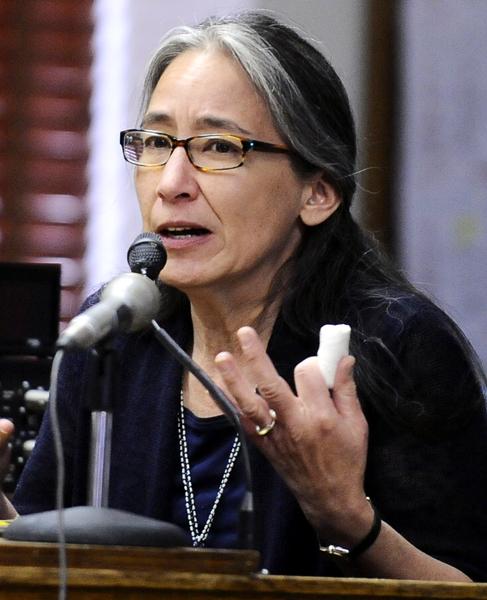
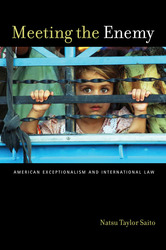
Natsu Saito, Meeting the Enemy: American Exceptionalism and International Law
Meeting the Enemy: American Exceptionalism and International Law is the title of Natsu Saito’s recent book, Natsu is an attorney and professor of Law at Georgia State University’s College of Law in Atlanta. The book boldly points out how the United States violated international law since its declaration of independence. As often discussed here on Law and Disorder, international courts and institutions have been at the forefront of holding the torture conspirators accountable. Meeting the Enemy gives disturbing insight into the origins of American exceptionalism.
Natsu Saito:
- The duality is that the US does exempt itself (from international law) very consistently and very frequently and yet promotes international law very strongly and relies upon it.
- It has relied upon certain premises that are fundamental to the whole outlook and paradigm of colonialism – which is that there is a higher good, a more civilized approach the US embodies.
- The law doesn’t apply because we have a higher aim of civilization and that justifies not playing by the rules.
- The United States making others comply with human rights standards while exempting itself.
- Moving humanity toward this higher goal is so critical because if you strip that away and you look at the realities on the ground, you see what has been termed Western civilization has been incredibly barbaric.
- In order to get around that analysis, you have to say it was for a higher good.
- I think the “left” tends to accept the general framework, and to make particular criticisms of policies and practices that are obviously problematic. The US government engaging in torture for example, but each instant is accepted as anomalous instead of the larger picture.
- It is too frightening even for the people on the left to deal with the reality that this is a country that sits on occupied land, illegally occupied by its own rules. People on the left want to make it a kinder, gentler colonialism.
- I started out thinking I was writing a book about the failure of the United States failure to comply with international law, as I got into it, the more interesting questions were the push / pull dynamics between reliance on international law
- The current system of international law evolved from the international law which was the agreement between the European colonial powers of how they were not going to destroy each other in the process of taking over the rest of the world.
Guest – Natsu Taylor Saito teaches international law and human rights, race and the law, immigration, criminal procedure, and professional responsibility, and is an advisor to the Asian American Law Student Association and the Hispanic Student Bar Association. Professor Saito’s scholarship focuses on the legal history of race in the United States, the plenary power doctrine as applied to immigrants, American Indians, and U.S. territorial possessions, and the human rights implications of U.S. governmental policies, particularly with regard to the suppression of political dissent. Read more.
——-
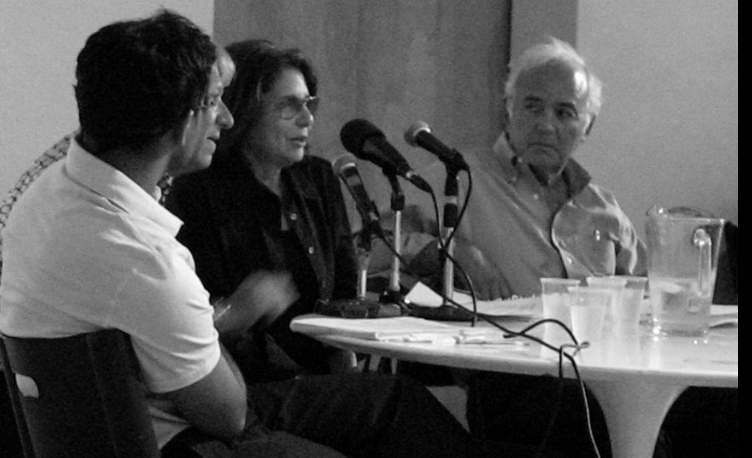
Elena Kagan and the Supremes – Brecht Forum
We hear excerpts from a discussion on the confirmation hearings of Elena Kagan, and how her position may influence the direction of the Supreme Court.
Panelists:
Martin Garbus – one of the country’s leading trial lawyers. Mr. Garbus aggressively represents his clients in the courts and in the media. He has appeared before the United States Supreme Court as well as the highest state and federal courts in the nation. His devotion to ethics, justice and the law has earned him respect among the legal community and beyond as well as prominent awards. Time Magazine has named him “legendary . . . one of the best trial lawyers in the country,” while Newsweek , the National Law Journal and other media agree that Mr. Garbus is America’s “most prominent First Amendment lawyer,” with an “extraordinarily diverse practice.” The National Law Journal named him one of the country’s top ten litigators.
Margaret Ratner Kunstler – former Educational Director at the Center for Constitutional Rights. She’s an attorney and leads the New York City chapter of the National Lawyers Guild and heads the William Moses Kunstler Fund for Racial Justice.
Anand Swaminathan – an associate at Vladeck, Waldman, Elias & Engelhard, P.C. He graduated from the University of Wisconsin in 2001 and the Harvard Law School in 2006. Prior to joining Vladeck he was a law clerk for the Honorable Theodore H. Katz of the United States District Court for the Southern District of New York.
Michael Steven Smith – Law and Disorder co-host, author and New York attorney. Michael Steven Smith is the author, editor, and co-editor of six books, including “The Emerging Police State,” by William M. Kunstler. He has testified before committees of the United States Congress and the United Nations on human rights issues. Mr. Smith lives and practices law in New York City with his wife Debby, where on behalf of seriously injured persons he sues insurance companies and occasionally the New York City Police Department.
———————
Afghanistan War, Civil Liberties, Criminalizing Dissent, Guantanamo, Human Rights, Iraq Veterans, Iraq War, Torture, Truth to Power, War Resister
Podcast: Play in new window | Download
Updates:
—–
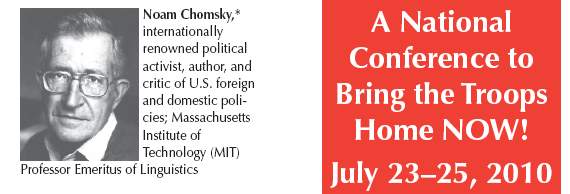
C0-host Michael Smith talks with attorney Jim Lafferty about the upcoming anti-war conference in Albany, New York, July 23-25. Noam Chomsky, internationally renowned political activist, author, and critic of U.S. foreign and domestic policies; Massachusetts Institute of Technology (MIT) Professor Emeritus of Linguistics is the keynote speaker. Click here for flyer (PDF) Groups sponsoring the event: After Downing Street, Arab American Union Members Council, Bail Out the People Movement, Black Agenda Report, Campus Antiwar Network, Campaign for Peace and Democracy, Citizen Soldier, Code Pink, Grandmothers Against the War, Granny Peace Brigade, International Action Center, Iraq Veterans Against the War, Military Families Speak Out, May 1st Workers and Immigrant Rights Coalition, National Assembly to End the Iraq and Afghanistan Wars and Occupations, National Lawyers Guild, Office of the Americas, Peace Action, Peace of the Action, Progressive Democrats of America, Project Salam, September Eleventh Families for Peaceful Tomorrows, The Fellowship of Reconciliation, U.S. Labor Against the War, Veterans for Peace, Voices for Creative Nonviolence, Voters for Peace,Women’s International League for Peace and Freedom, The World Can’t Wait.
—
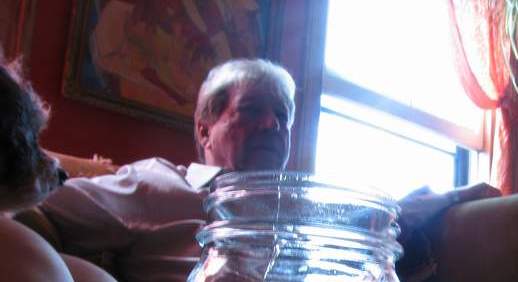
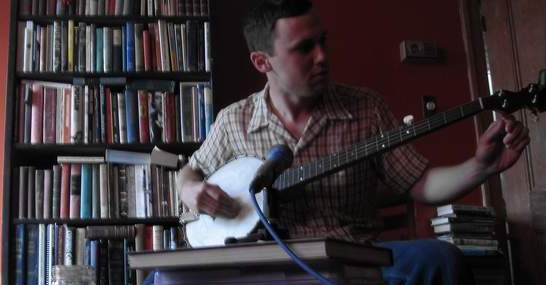
Iraq War Veteran, Conscientious Objector and Musician Clifton Hicks
Clifton Hicks is an activist with the Iraqi Veterans Against the War. Hicks is disabled and enrolled as an Anthropology student at Appalachian State University in Boone, North Carolina. Appalachian State is a center for old-time music, and Hicks is also an accomplished musician and banjo player. Cliff Hicks is psychologically disabled and got out of the Army as a conscientious objector several years ago. In the Spring issue of The Veteran, published by Vietnam Veterans Against the War, there’s printed the following chant, that is repeated by soldiers in training to go to Iraq. “I went down to the market where all the people shop, I pulled out my machete, and I began to chop, I went down to the park where all the children play, I took out my machine gun and I began to spray.” This is the kind of psychological brutalization that our young men are forced to endure that turn them into creatures they never thought they’d become.
Clifton Hicks:
- I was in 9th grade when 9/11 happened. I called the recruiter when I was 16, to try and get in.
- I saw Muslim and Arabic people and thought they were all out to get us.
- I listened to a lot of daytime AM right-wing radio. I had the ole cliche patriotic notions going.
- I wanted to go combat arms from the start, I figured if I was going into the Army, I wanted to fight.
- My feet were on the ground in Iraq in October 2003. The guys I was with that had already been there for a while had gotten pretty nasty. Guys get nasty, because their friends get killed and you realized you can’t trust anybody.
- We were the first division in combat to be out there for more than 13 months.
- They would literally give us candy and toys to give out to Iraqi kids at schools, the next day you’re ridin’ around and you see a b unch of kids get shot.
- I became an anti-war activist while I was still in the Army. We started an IVAW chapter in Gainesville Florida
Guest – Clifton Hicks, Branch of service: United States Army (USA) / Unit: C Troop, 1st Squadron, 1st U.S. Cavalry Regiment / Rank: PFC / Home: North Carolina / Served in: Ft. Knox, OIF 1, Germany. Hicks a musician and is currently a student at Appalachian State University in Boone, North Carolina.
——————————————————————–
Civil Liberties, Criminalizing Dissent, Guantanamo, Habeas Corpus, Human Rights, Surveillance, Truth to Power
Podcast: Play in new window | Download
Updates:
—
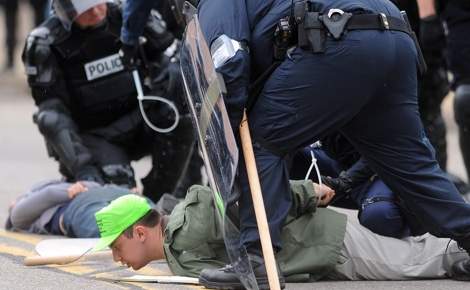

Pittsburgh’s Citizen Police Review Board Demands G20 Police Records, Faces Dismantling
Pittsburgh’s city council is worried that if the city’s Citizen Police Review Board are allowed to scrutinize secret records of officer conduct during the G-20 economic summit, more protesters will sue and possibly jeopardize a $20 million liability insurance policy the city bought before the International Summit last year. We could lose our homes over this,” said City Councilwoman Theresa Smith, chairwoman of the public safety committee.. “If we don’t have insurance, then it falls to us.” The Seeds of Peace Collective and Three Rivers Climate Convergence have filed a joint federal lawsuit against the city charging that police violated their First and 14th Amendment rights at two events. Meanwhile, city hall has started the nomination process to remove most of the members of the Pittsburgh Citizen Police Review Board.
Elizabeth Pittinger:
- The Pittsburgh Citizen Police Review Board does have subpoena power and when they initiated their inquiry last October, a general request of a number of documents to be turned over so we could begin the inquiry. The city resisted providing that information.
- In December the chair of the Citizen Police Review Board issued a subpoena demanding that police reports specified by number be turned over in addition to operational material and documents.
- On March 18, the courts issued an order directing the city to provide the documents. They finally gave us a stack of more than 300 pages of police reports that were so heavily redacted they were substantively illegible.
- We went back to court seeking that they would have to provide the information in an un-redacted form and that has led to this controversy with city council.
- The Pittsburgh City Council is coming forward with a document called “the will of council” urging the police review board to slow down its inquiry.
- What has happened now is that the request of these G20 documents is really the vehicle that the city has now created to challenge the board’s right of access to any document.
- Protesters hit with OC Vapor – Invisible Vaporized Pepper Spray
Guest – Elizabeth Pittinger, the Executive Director of the Pittsburgh Citizen Police Review Board.
——–
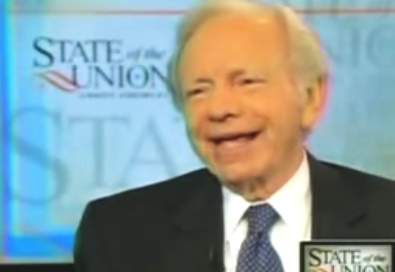
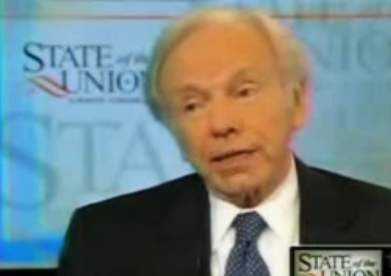
“Cyber War” Creates Need For Internet “Kill Switch”
Senator Lieberman and Senator Susan Collins have the attention of civil liberties and privacy experts as they craft a bill that would allow the take over of the civilian internet network during an emergency. After initial outcry, Senator Lieberman told the media, the Internet Kill Switch bill is a matter of national security, and a kill switch is needed to disconnect immediately from a foreign nation in case of an attack. He continues, “Right now, China, the government, can disconnect parts of its Internet in a case of war. We need to have that here too,” Protecting Cyberspace as a National Asset Act of 2010 is the name of the bill, and supporters argue that it is not a kill switch, but a way to divert traffic away from another country. It is added that the President already has broad powers to shut off any and all regulated telecommunications in the 1934 Telecommunications Act.
Tracy Rosenberg:
- I think its clear by the way the bill is currently written, the president could target political groups, but that’s not the intent of the bill. It doesn’t mean it couldn’t be used in that fashion. The information sharing is quite similar to what happened after 9/11. It potentially creates a situation where corporate providers basically rat out parties at the instructions of the government. That could certainly be directed at political viewpoints.
- Internet sites could potentially be shut down. Information about who is posting to them, who is reading them and who owns them will become the property of the federal government.
- Another motivation behind the bill – Litigation and liability protection for internet companies.
- Internet use in China is considerably compromised
Guest – Tracy Rosenberg, Executive Director of Media Alliance since 2007. She has organized and advocated for a free, accountable and accessible media system,focusing on the protection and sustainability of alternative media outlets from Pacifica Radio to low-power FM, public access and Indymedia, monitored the mainstream media for accuracy and fair representation and facilitated the training of numerous nonprofit organizations and citizen’s groups in effective communications.
—–
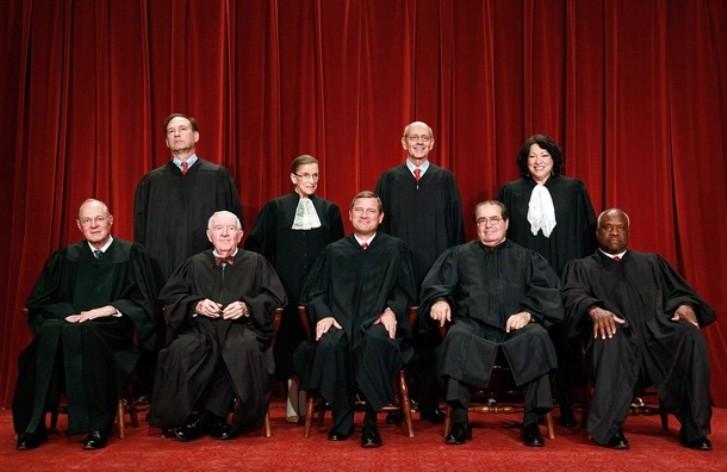
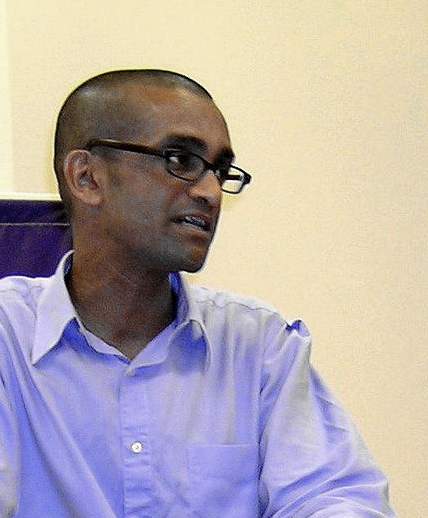
A Dark Day For Human Rights
The Supreme Court’s decision to preserve a vague prohibition on aiding and associating with terrorist groups severely reduced the First Amendment rights of American citizens. The decision could have serious impact on lawyers, journalists and academics who represent or study terrorist groups. The new decision came from a case by the Humanitarian Law Project that challenged the law of prohibiting “material support” to terror groups. The law projected wanted to provide advice to two terrorist groups on how to peacefully resolve their disputes with the United Nations and International Law. The Supreme Court ruled that the peaceful assistance is aiding terrorism.
Shane Kadidal:
- A number of Justices were skeptical about the ways this law may be applied to journalists, to lawyers representing unpopular clients. “Speech discouraging violence can be banned under the First Amendment.”
- Solicitor General Kagan was asked if a lawyer is entitled to represent someone on the FTO list.
- Foreign Terrorist Organization List.
- Kagan says if you have some Constitutional right to be in court then the statutes should be interpreted in a way to allow the lawyer to represent someone in those circumstances.
- If you think about it, it took the Guantanamo lawyers 7 years to establish if there was a Constitutional right to challenge your detention if you’re a non-citizen.
- Kagan is saying that lawyers were taking their chances to represent Guantanamo lawyers in the first place.
- Lynn Cheney’s group : Keep America Safe.
- You couldn’t send books on Federalism to the Tigers of Tamil Eelam who are on the FTO list.
- The law defines material support to be more than tangible things like guns, and money but also things like personal services, expert advice and assistance. Those terms are so broad.
- (Treating a wounded person with your medical skills) Humanitarian aid during crisis at risk.
- That’s one of the fundamental problems with vague statutes. They give too much discretion to law enforcement, if everything is prohibited than law enforcement is going to be selective on who they choose to prosecute. The government likes that. Greenpeace would easily qualify.
- President Clinton was the first to use this law directed at whole nations such as Nazi Germany or Cuba and instead direct them at political organizations.
- The government has used this law 150 times since 9/11. Statute of limitations of 8 years.
Guest – Shane Kadidal senior managing attorney of the Guantánamo Global Justice Initiative at the Center for Constitutional Rights in New York City. He is a graduate of the Yale Law School and a former law clerk to Judge Kermit Lipez of the United States Court of Appeals for the First Circuit.
————————————————————————




